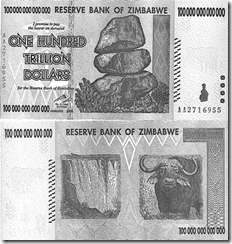A few days ago, I held in my hands a quadrillion dollars. Really, I did. They are ten 100 trillion notes in Zimbabwean dollars, purchased from a scripophily dealer in New Hampshire. I thought they would make good stocking-stuffers for this holiday season and would help to promote reflection among my family and friends on the threats of inflation and deflation we face. (For this inspiration, I owe thanks to my economist colleague, Professor Alan Beckenstein, whom I saw in New Delhi with one of these Z$100 trn notes.)
The very sad story of Zimbabwe’s currency is summarized in a brief but impressive entry in Wikipedia. Suffice it to say, bad government policies and some bad luck ruined the economy of that country. Inflation in Zimbabwe ran at astronomically high rates. In November, 2008, inflation in the Z$ was running at 98% per day (according to Steven Hanke of Johns Hopkins) and ceased being used as the medium of exchange in most commercial transactions. The Economist reported that since the suspension of the Z$, inflation abated to 5.3% in June, 2010.
Unfortunately, Zimbabwe is not alone in the annals of history. Today’s Wall Street Journal carries an article, “Venezuela to Devalue Currency.” This is the second devaluation in the past year, and the fifth since 1999, when Chavez assumed power. To deal with the consequences of his populist policies, Chavez has instituted price controls, among which is his devaluation of the bolivar in exchange for foreign currencies. The article reports that Venezuela’s inflation rate is 26.9%, among the highest in the world today.
Perhaps one of the most arresting cases of currency debasement is that of Germany in the early 1920s. Steven Hanke reports that in October, 1923, Germany suffered a daily inflation rate of 20.9%–it took 3.7 days for prices to double. Germany had been the leading industrial power of the world in 1913. Then, devastated by the First World War, it careened into a bout of hyperinflation that almost delivered a communist revolution and eventually a Nazi takeover.
I am reading Adam Fergusson’s When Money Dies —this is a history of the hyperinflation in Weimar Germany. Very well-written and engaging, the book proceeds almost at the pace of a thriller. Economists may be disappointed at the relative lack of reliance on economic data. But that is to miss the book’s thrust: it presents a stunning perspective on the social and political effects of inflation. Fergusson writes:
“…inflation aggravated every evil, ruined every chance of national revival or individual success, and eventually produced precisely the conditions in which extremists of Right and Left could raise the mob against the State, set class against class, race against race, family against family, husband against wife, trade against trade, town against country. It undermined national resolution when simple want or need might have bolstered it. Partly because of its unfairly discriminatory nature, it brought out the worst in everybody—industrialist and worker, farmer and peasant, banker and shopkeeper, politician and civil servant, housewife, soldier, merchant, tradesman, miner, moneylender, pensioner, doctor, trade union leader, student, tourist—especially the tourist. It caused fear and insecurity among those who had already known too much of both. It fostered xenophobia. It promoted contempt for government and subversion of law and order. It corrupted even where corruption had been unknown, and too often where it should have been impossible. It was the worst possible prelude—although detached from it by several years—to the great depression and thus to what followed.” (pages 3-4.)
The U.S. and global economies have been through a financial and economic crisis of epic proportions over the past four years. Here, near the dawn of 2011, I don’t think the United States is anywhere near the conditions that Fergusson describes. Yet we haven’t recovered yet; the financial system remains fragile. And the massive program of quantitative easing by the U.S. Federal Reserve will eventually require very adroit management of the money supply. Once the economy recovers, how do we counteract the remedies? Robert Barro has a new paper that frets about how the Fed will unwind QE2. In this context, Zimbabwe, Venezuela, and Germany are useful reminders of the consequences of macroeconomic shocks.
Among such shocks is the blow to national pride. In this sense, an epilogue to the story of the fall of the Zimbabwe dollar is a sign, posted in an establishment there, advising patrons not to flush Zimbabwe dollars down the toilet—an arresting metaphor for what has happened to that country’s economy (see this.)

